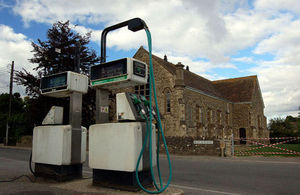European Commission approves new rural fuel tax cut
UK's most rural communities a step closer to getting a fuel price cut.

Fuel pump
17 of the UK’s most rural communities are a step closer to getting up to a 5p per litre fuel price cut after the government’s rural fuel rebate scheme cleared the major hurdle of European Commission (EC) approval today (15 January 2015), Chief Secretary to the Treasury Danny Alexander has announced.
The Chief Secretary spearheaded the government’s application to the EC for 17 of the most rural areas in mainland UK to receive an up to 5 pence per litre (ppl) fuel duty discount last year.
The scheme will allow 125,000 people living the selected areas, who currently face some of the highest fuel prices in the country despite depending on cars for transport, to benefit from cheaper fuel.
The UK’s most rural islands already receive this discount, but it will be the first time ever that the Commission has approved a fuel discount in on the mainland in the UK.
Commission approval means that the issue is now awaiting agreement from other member states through the Council of the European Union.
With a view to implementing the scheme in the current Parliament, the government is pressing ahead with a formal consultation on the regulations necessary to implement the change today.
Chief Secretary to the Treasury, Danny Alexander said:
This is great news for motorists in these areas and brings a duty discount a step closer. Even though fuel prices are falling across the country, they are still higher in very rural areas. As someone who comes from one of the most rural areas in the UK, I know that for people who live in these areas cars are a necessity, not a luxury. I’ve fought hard to reach this major milestone.
While we have one more stage to go, I want to make sure we are ready to implement this as a top priority so we will press for this to be heard as soon as possible and are today publishing the necessary draft regulations. I’m determined to implement the rural fuel rebate in the current Parliament as part of this government’s drive for a stronger economy and fairer society.
The 17 areas which included in the government’s application the European Commission are:
- IV54 (Highland – Scotland)
- IV26 (Highland – Scotland)
- IV27 (Highland – Scotland)
- NE48 (Northumberland – England)
- PH41 (Highland – Scotland)
- KW12 (Highland – Scotland)
- PA80 (Argyll and Bute – Scotland)
- PH36 (Highland – Scotland)
- IV22 (Highland – Scotland)
- PA38 (Argyll and Bute – Scotland)
- PH23 (Highland – Scotland)
- PH19 (Highland – Scotland)
- IV21 (Highland – Scotland)
- LA17 (Cumbria – England)
- EX35 (Devon – England)
- IV14 (Highland – Scotland)
- Hawes (North Yorkshire – England)
These areas have been selected using the following criteria:
- pump price threshold: pump prices have to be more expensive than the lowest pump price on the islands in the existing scheme, during the months examined
- cost of transporting fuel: areas have to be over 100 miles by road from the nearest refinery
- population density: population density must be no higher than any area in the current scheme
Areas that did not adequately fulfil these criteria were not included in the application, as the government considered them to be unlikely to receive approval from the European Commission.
The current rural fuel rebate scheme came into effect in March 2012 and allows retailers of road fuel within the Inner and Outer Hebrides, the Northern Isles, the Islands of the Clyde and the Isles of Scilly to register with HM Revenue & Customs (HMRC) to claim back a five pence per litre relief on unleaded petrol and diesel for retail sale within the eligible areas.
Retailers of road fuel within these geographical areas will be eligible to register with HMRC and to claim back up to 5 pence per litre duty relief on purchases of unleaded petrol and diesel for retail sale within the eligible areas. They will be entitled to claim the relief from HMRC on a monthly basis.